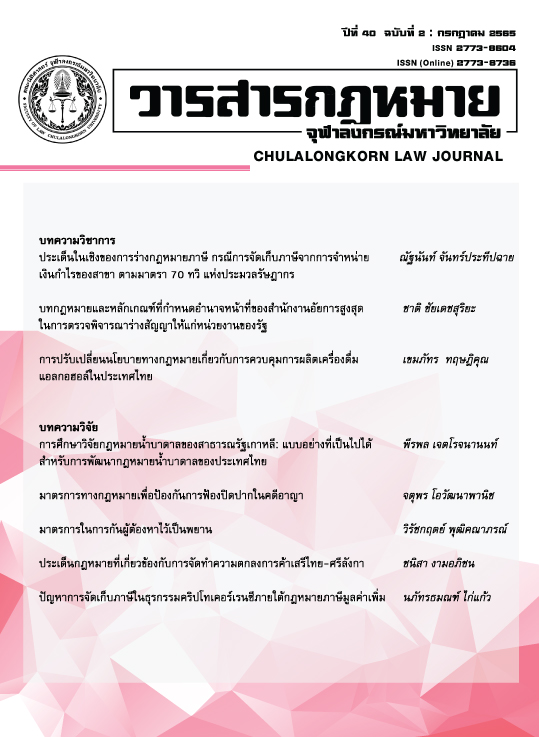Taxation Issues in Cryptocurrency Transactions under Value Added Tax law
Main Article Content
Abstract
Most cryptocurrency exchanges are in the form of profitable investments. The VAT law under the Revenue Code interprets cryptocurrencies as a type of electronic service (e-Service), which is in many ways inappropriate. The main issue is that cryptocurrencies, due to their unique nature, cannot be interpreted as goods or services under VAT law. Furthermore, some practical VAT procedures may not apply to cryptocurrency transactions. And the nature of cryptocurrency trading does not include the added value of each manufacturing, distribution, or service chain, which is an important aspect of VAT collection. As a result, enforcing and inspecting entrepreneurs for VAT registration, including issuing VAT documents, is difficult. The purpose of this research paper is to look into the issue of inappropriateness that has arisen as a result of the interpretation of cryptocurrencies under Thailand's VAT law, as well as to consider other types of consumption tax collection that may be more appropriate. According to the findings of the study, a Specific Business Tax system which is taxed on a per-transaction basis is more appropriate for cryptocurrency trading transactions. As a result, the author therefore recommends that cryptocurrency trading transactions should be subject to a Specific Business Tax system.
Article Details

This work is licensed under a Creative Commons Attribution-NonCommercial-NoDerivatives 4.0 International License.
The copyright in this website and the material on this website (including without limitation the text, computer code, artwork, photographs, images, music, audio material, video material and audio-visual material on this website) is owned by Chulalongkorn University Law Journal and its licensors.
1. Chulalongkorn University Law Journal grants to you a worldwide non-exclusive royalty-free revocable license to:
- view this website and the material on this website on a computer or mobile device via a web browser;
- copy and store this website and the material on this website in your web browser cache memory; and
- print pages from this website for your use.
- All articles published by Chulalongkorn University Law Journal are licensed under the Creative Commons Attribution 4.0 International License. This permits anyone to copy, redistribute, remix, transmit and adapt the work provided the original work and source is appropriately cited.
2. Chulalongkorn University Law Journal does not grant you any other rights in relation to this website or the material on this website. In other words, all other rights are reserved. For the avoidance of doubt, you must not adapt, edit, change, transform, publish, republish, distribute, redistribute, broadcast, rebroadcast or show or play in public this website or the material on this website (in any form or media) without appropriately and conspicuously citing the original work and source or Chulalongkorn University Law Journal prior written permission.
3. You may request permission to use the copyright materials on this website by writing to journal@law.chula.ac.th.
4. Chulalongkorn University Law Journal takes the protection of its copyright very seriously. If Chulalongkorn University Law Journal discovers that you have used its copyright materials in contravention of the license above, Chulalongkorn University Law Journal may bring legal proceedings against you seeking monetary damages and an injunction to stop you using those materials. You could also be ordered to pay legal costs.
If you become aware of any use of Chulalongkorn University Law Journal's copyright materials that contravenes or may contravene the license above or any material on the website that you believe infringes your or any other person's copyright, please report this by email to journal@law.chula.ac.th.


